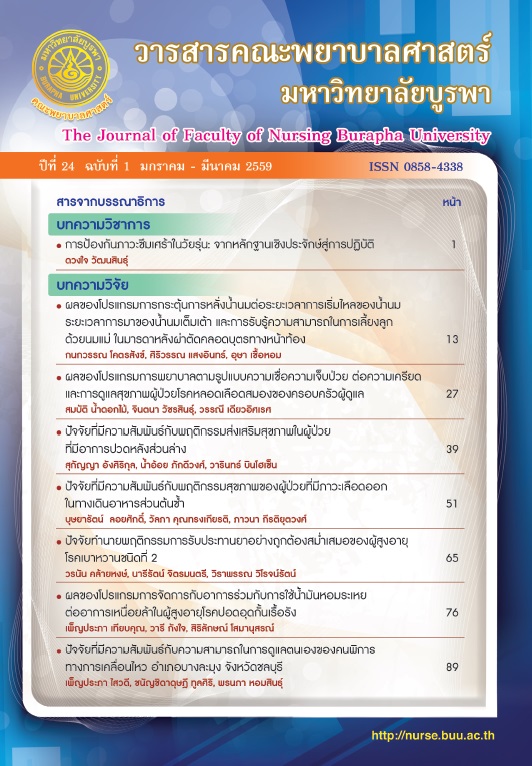ปัจจัยที่มีความสัมพันธ์กับพฤติกรรมสุขภาพของผู้ป่วยที่มีภาวะเลือดออก ในทางเดินอาหารส่วนต้นซ้ำ
คำสำคัญ:
พฤติกรรมสุขภาพ, ผู้ป่วยที่มีภาวะเลือดออกในทางเดินอาหารส่วนต้นซ้ำ, Health behaviors, upper gastrointestinal rebleeding patientsบทคัดย่อ
บทคัดย่อ
การวิจัยครั้งนี้ เป็นการวิจัยเชิงพรรณนาแบบหาความสัมพันธ์ มีวัตถุประสงค์เพื่อศึกษาความสัมพันธ์ของพฤติกรรมสุขภาพของผู้ป่วยที่มีภาวะเลือดออกในทางเดินอาหารส่วนต้นซ้ำกลุ่มตัวอย่างที่ศึกษา คือ ผู้ป่วยที่ได้รับการวินิจฉัยจากแพทย์ว่ามีภาวะเลือดออกในทางเดินอาหารส่วนต้นซ้ำ ที่มารับการตรวจรักษา ณ หอผู้ป่วยในแผนกศัลยกรรม และอายุรกรรม ในเขตภาคตะวันออก 3 โรงพยาบาล คือ โรงพยาบาลพระปกเกล้า จังหวัดจันทบุรี โรงพยาบาลตราด และโรงพยาบาลสมเด็จพระยุพราชสระแก้ว จำนวน 100 คน ที่มีคุณสมบัติตามที่กำหนด เก็บรวบรวมข้อมูลโดยใช้แบบสอบถามที่ผู้วิจัยสร้างขึ้น ประกอบด้วยแบบสอบถามข้อมูลทั่วไป แบบสอบถามข้อมูลเกี่ยวกับพฤติกรรมสุขภาพของผู้ป่วยที่มีภาวะเลือดออกในทางเดินอาหารส่วนต้นซ้ำ และแบบสอบถามข้อมูลเกี่ยวกับการรับรู้ความเชื่อด้านสุขภาพ สถิติที่ใช้ในการวิเคราะห์ข้อมูลประกอบด้วย สถิติเชิงพรรณนาและสัมประสิทธิ์สหสัมพันธ์ของเพียรสัน
จากผลการศึกษาพบว่า พฤติกรรมสุขภาพโดยรวมอยู่ในระดับค่อนไปทางสูง (M = 46.11, SD = 3.61) ส่วนปัจจัยที่มีความสัมพันธ์กับพฤติกรรมสุขภาพของผู้ป่วยที่มีภาวะเลือดออกในทางเดินอาหารส่วนต้นซ้ำ อย่างมีนัยสำคัญทางสถิติ ได้แก่ การรับรู้อุปสรรคต่อการปฏิบัติพฤติกรรมเพื่อป้องกันการเกิดโรคซ้ำ (r = -.40, p < .01) แต่ปัจจัยด้าน การรับรู้โอกาสเสี่ยงของการเกิดโรคซ้ำการรับรู้ความรุนแรงของการเกิดโรคซ้ำ การรับรู้ประโยชน์ ของการปฏิบัติพฤติกรรมเพื่อป้องกันการเกิดโรคซ้ำ และสิ่งชักนำให้เกิดการปฏิบัติ ไม่มีความ สัมพันธ์กับพฤติกรรมสุขภาพของผู้ป่วยที่มีภาวะเลือดออกในทางเดินอาหารส่วนต้นซ้ำ (p > .05) จากผลการศึกษามีข้อเสนอแนะว่าพยาบาลและบุคลากรสุขภาพอื่นควรส่งเสริมให้ผู้ป่วยเพิ่มการรับรู้อุปสรรคต่อการปฏิบัติพฤติกรรมเพื่อป้องกันการเกิดโรคซ้ำให้กับผู้ป่วย เพื่อให้มีพฤติกรรมสุขภาพที่ดีขึ้น
Abstract
This correlation descriptive research study aimed to identify the factors related to health behaviors among upper gastrointestinal rebleeding patients in eastern region. One hundred upper gastrointestinal rebleeding patients who met inclusion criteria and admitted inpatient surgical and medical department in 3 hospitals of eastern region, Prapokklao hospital Chanthaburi, Trat hospital and Somdet Phrayuppharat Sa Kaeo hospital. Data were collected with self-administered questionnaires developed by the researcher. The instruments consisted of a personal information questionnaire, health behavior questionnaire and perception of health belief model questionnaire. Data were analyzed by using descriptive statistics and Pearson’s product moment correlation coefficient.
The findings showed that overall health behaviors score was higher levels (M = 46.11, SD = 3.61). Factors related to health behaviors among upper gastrointestinal rebleeding patients were perceived barriers (r = -.40, p < .01). However, perceived susceptibility, perceived severity, perceived benefits and cues to action were not related to health behaviors among upper gastrointestinal rebleeding patients (p > .05). The findings suggest that nurses and other health professional should promote health behavior by increase of perception of barriers for the prevention of recurrent disease for better health behavior.





